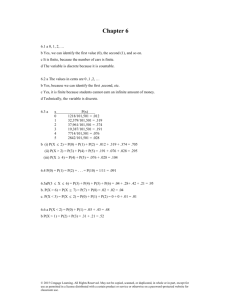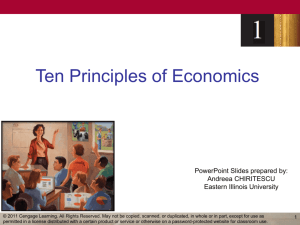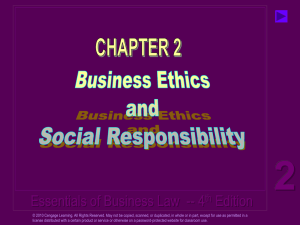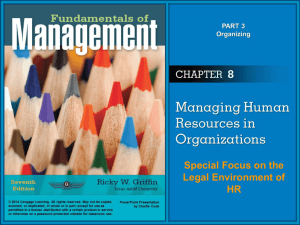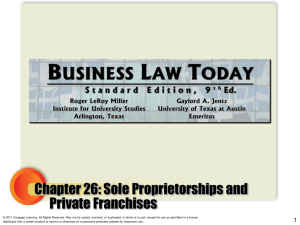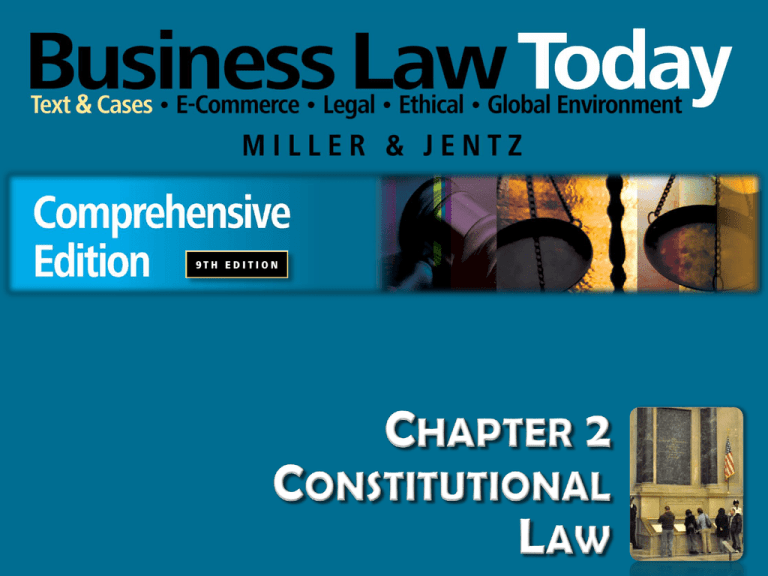
• What is the basic structure of the
United States government?
• What constitutional clause gives the
federal government the power to
regulate commercial activities among
the various states?
© 2012 Cengage Learning. All Rights Reserved. May not be copied, scanned, or duplicated, in whole or in part, except for use as
permitted in a license distributed with a certain product or service or otherwise on a password-protected website for classroom use.
2
• What constitutional clause allows laws
enacted by the federal government to
take priority over conflicting state
laws?
• What is the Bill of Rights? What
freedoms are guaranteed by the First
Amendment?
© 2012 Cengage Learning. All Rights Reserved. May not be copied, scanned, or duplicated, in whole or in part, except for use as
permitted in a license distributed with a certain product or service or otherwise on a password-protected website for classroom use.
3
• Where in the Constitution can the due
process clause be found?
© 2012 Cengage Learning. All Rights Reserved. May not be copied, scanned, or duplicated, in whole or in part, except for use as
permitted in a license distributed with a certain product or service or otherwise on a password-protected website for classroom use.
4
• A Federal Form of Government: the
federal constitution was a political
compromise between advocates of
state sovereignty and central
government.
© 2012 Cengage Learning. All Rights Reserved. May not be copied, scanned, or duplicated, in whole or in part, except for use as
permitted in a license distributed with a certain product or service or otherwise on a password-protected website for classroom use.
5
• Separation of Powers: Executive,
Legislative and Judicial. Provides
checks and balances.
–Legislative: enacts laws.
–Executive: enforces laws.
–Judicial: declares laws/actions
unconstitutional.
© 2012 Cengage Learning. All Rights Reserved. May not be copied, scanned, or duplicated, in whole or in part, except for use as
permitted in a license distributed with a certain product or service or otherwise on a password-protected website for classroom use.
6
• The Commerce Clause.
– U.S. Constitution gives Congress the
power to: “regulate Commerce with
foreign Nations, and among the
several States, and with the Indian
tribes.” (Art. 1 § 8)
– Greatest impact on business than any
other Constitutional provision.
© 2012 Cengage Learning. All Rights Reserved. May not be copied, scanned, or duplicated, in whole or in part, except for use as
permitted in a license distributed with a certain product or service or otherwise on a password-protected website for classroom use.
7
• The Commerce Clause (cont’d).
–Gibbons v. Ogden (1824). To Chief
Justice Marshall, commerce meant all
business dealings that substantially
affected more than one state. The
national government had the exclusive
power to regulate interstate
commerce.
© 2012 Cengage Learning. All Rights Reserved. May not be copied, scanned, or duplicated, in whole or in part, except for use as
permitted in a license distributed with a certain product or service or otherwise on a password-protected website for classroom use.
8
• The Commerce Clause (cont’d).
–Commerce Clause and the Expansion
of National Powers.
• Wickard v. Filburn (1942). Purely local
production, sale and consumption of
wheat was subject to federal regulation.
© 2012 Cengage Learning. All Rights Reserved. May not be copied, scanned, or duplicated, in whole or in part, except for use as
permitted in a license distributed with a certain product or service or otherwise on a password-protected website for classroom use.
9
• The Commerce Clause (cont’d).
–Commerce Clause Today: theoretically
the commerce clause applies to
virtually all commercial transactions.
–The commerce clause applies to ecommerce internet transactions.
© 2012 Cengage Learning. All Rights Reserved. May not be copied, scanned, or duplicated, in whole or in part, except for use as
permitted in a license distributed with a certain product or service or otherwise on a password-protected website for classroom use.
10
• The Commerce Clause (cont’d).
–Regulatory Powers of the States.
• Tenth Amendment reserves all powers to
the states that have not been expressly
delegated to the national government.
• State have inherent “police powers”:
including right to regulate health, safety,
morals and general welfare, licensing,
building codes, parking regulations and
zoning restrictions.
© 2012 Cengage Learning. All Rights Reserved. May not be copied, scanned, or duplicated, in whole or in part, except for use as
permitted in a license distributed with a certain product or service or otherwise on a password-protected website for classroom use.
11
• The Commerce Clause (cont’d).
–“Dormant” Power Clause.
• National government has exclusive power to
regulate interstate commerce. States only have a
“dormant” (negative) power to regulate
interstate commerce. Courts balance state’s
interest vs. national interest.
• CASE 2.1 Family Winemakers of California v.
Jenkins (2010). Massachusetts law violated the
commerce clause.
© 2012 Cengage Learning. All Rights Reserved. May not be copied, scanned, or duplicated, in whole or in part, except for use as
permitted in a license distributed with a certain product or service or otherwise on a password-protected website for classroom use.
12
• The Commerce Clause (cont’d).
–The Supremacy Clause.
• Article VI of the Constitution provides that
Constitution, laws and treaties of the United
States are the “supreme law of the land.”
• Concurrent: in few areas, both states and federal
government share powers.
• Preemption: when Congress chooses to act in a
concurrent area, federal law preempts state law.
• 2008: Riegel v. Medtronic. Plaintiff’s claims under
state common law were preempted.
© 2012 Cengage Learning. All Rights Reserved. May not be copied, scanned, or duplicated, in whole or in part, except for use as
permitted in a license distributed with a certain product or service or otherwise on a password-protected website for classroom use.
13
• 1791: Ten written guarantees of
protection of individual liberties from
government interference.
• Limits on Federal and State
Governmental Actions.
– Originally, Bill of Rights only applied to
the federal government.
© 2012 Cengage Learning. All Rights Reserved. May not be copied, scanned, or duplicated, in whole or in part, except for use as
permitted in a license distributed with a certain product or service or otherwise on a password-protected website for classroom use.
14
• Limits on Federal and State
Governmental Actions (cont’d).
– Later, the Bill of Rights was
“incorporated” and applied to the States
as well.
– Some protections also apply to
businesses.
© 2012 Cengage Learning. All Rights Reserved. May not be copied, scanned, or duplicated, in whole or in part, except for use as
permitted in a license distributed with a certain product or service or otherwise on a password-protected website for classroom use.
15
• The First Amendment – Freedom of
Speech.
–Right to Free Speech
is the basis for our
democratic government.
–Free speech also includes “symbolic”
speech, including gestures, movements,
articles of clothing.
© 2012 Cengage Learning. All Rights Reserved. May not be copied, scanned, or duplicated, in whole or in part, except for use as
permitted in a license distributed with a certain product or service or otherwise on a password-protected website for classroom use.
16
• Freedom of Speech (cont’d).
–Reasonable Restrictions.
• Balance between government’s obligation
to protect, and citizen’s exercise of rights:
• Restriction must be content-neutral.
• Aimed at combating some social problem
(such as crime).
• Schools can restricts students’ right to
speech.
© 2012 Cengage Learning. All Rights Reserved. May not be copied, scanned, or duplicated, in whole or in part, except for use as
permitted in a license distributed with a certain product or service or otherwise on a password-protected website for classroom use.
17
• Freedom of Speech (cont’d).
–Corporate Political Speech.
• Political speech by corporations is
protected by the First Amendment.
• In Citizens United v. Federal Election
Commission (2010) the Supreme Court
ruled that corporations can spend freely to
support or oppose candidates for
President and Congress.
© 2012 Cengage Learning. All Rights Reserved. May not be copied, scanned, or duplicated, in whole or in part, except for use as
permitted in a license distributed with a certain product or service or otherwise on a password-protected website for classroom use.
18
• Freedom of Speech (cont’d).
–Commercial Speech.
• Courts give substantial protection to
commercial speech (advertising).
• Restrictions must: Implement substantial
government interest; directly advance that
interest; and go no further than necessary.
© 2012 Cengage Learning. All Rights Reserved. May not be copied, scanned, or duplicated, in whole or in part, except for use as
permitted in a license distributed with a certain product or service or otherwise on a password-protected website for classroom use.
19
• Freedom of Speech (cont’d).
–Commercial Speech (cont’d).
• Courts give substantial protection to
commercial speech (advertising).
• Restrictions must: Implement substantial
government interest; directly advance that
interest; and go no further than necessary.
© 2012 Cengage Learning. All Rights Reserved. May not be copied, scanned, or duplicated, in whole or in part, except for use as
permitted in a license distributed with a certain product or service or otherwise on a password-protected website for classroom use.
20
• Freedom of Speech (cont’d).
–Commercial Speech (cont’d).
• CASE 2.2 Bad Frog Brewery, Inc. v. New
York State Liquor Authority (2003). Did
the State unconstitutionally restrict
commercial speech when it prohibited a
certain gesture (illustration) on beer
labels?
© 2012 Cengage Learning. All Rights Reserved. May not be copied, scanned, or duplicated, in whole or in part, except for use as
permitted in a license distributed with a certain product or service or otherwise on a password-protected website for classroom use.
21
• Freedom of Speech (cont’d).
–Unprotected Speech.
• U.S. Supreme Court has held that certain
speech is NOT protected:
–Defamatory speech.
–Threatening speech that violates criminal
laws.
–Fighting Words.
–Obscene Speech.
© 2012 Cengage Learning. All Rights Reserved. May not be copied, scanned, or duplicated, in whole or in part, except for use as
permitted in a license distributed with a certain product or service or otherwise on a password-protected website for classroom use.
22
• Freedom of Speech (cont’d).
–Online Obscenity.
• Congress has attempted to protect children
from online pornography have been ruled
unconstitutional restriction on free speech.
–Children’s Internet Protection Act (2000) which
requires filters for computers in public libraries
and public schools). Challenged, in court.
–What about “hate” speech on the web?
© 2012 Cengage Learning. All Rights Reserved. May not be copied, scanned, or duplicated, in whole or in part, except for use as
permitted in a license distributed with a certain product or service or otherwise on a password-protected website for classroom use.
23
• First Amendment - Freedom of
Religion.
–First Amendment may not “establish” a
religion or prohibit the “free exercise” of
religion.
–The Establishment Clause: prohibits
government from establishing a statesponsored religion, or passing laws that
favor one over the other.
© 2012 Cengage Learning. All Rights Reserved. May not be copied, scanned, or duplicated, in whole or in part, except for use as
permitted in a license distributed with a certain product or service or otherwise on a password-protected website for classroom use.
24
• Freedom of Religion (cont’d).
–Establishment Clause (cont’d).
• CASE 2.3 In Re Episcopal Church Cases
(2009). Can a secular court resolve an
internal dispute about church property
without becoming impermissibly entangled
with religion?
© 2012 Cengage Learning. All Rights Reserved. May not be copied, scanned, or duplicated, in whole or in part, except for use as
permitted in a license distributed with a certain product or service or otherwise on a password-protected website for classroom use.
25
• Freedom of Religion (cont’d).
–The Free Exercise Clause: First
Amendment guarantees the “free
exercise” of religion.
• Employers must reasonably
accommodate beliefs as long as employee
has sincerely held beliefs.
© 2012 Cengage Learning. All Rights Reserved. May not be copied, scanned, or duplicated, in whole or in part, except for use as
permitted in a license distributed with a certain product or service or otherwise on a password-protected website for classroom use.
26
• Due Process is both procedural and
substantive.
–Procedural Due Process: any government
decision to take life, liberty or property must be fair.
Requires: Notice and Fair Hearing.
–Substantive Due Process: focuses on the
content or the legislation (the right itself).
– Fundamental Right: requires compelling state
interest.
– Non-Fundamental: rational relationship to state
interest.
© 2012 Cengage Learning. All Rights Reserved. May not be copied, scanned, or duplicated, in whole or in part, except for use as
permitted in a license distributed with a certain product or service or otherwise on a password-protected website for classroom use.
27
• Equal Protection.
–Government must treat similarly
situated individuals (or businesses) in
the same manner. Courts apply
different tests:
• Minimum scrutiny-economic rights.
• Intermediate scrutiny.
• Strict Scrutiny – fundamental rights.
© 2012 Cengage Learning. All Rights Reserved. May not be copied, scanned, or duplicated, in whole or in part, except for use as
permitted in a license distributed with a certain product or service or otherwise on a password-protected website for classroom use.
28
• Constitutional Protection of Privacy
Rights.
–Griswold v. Connecticut (1965) found a
right to personal privacy implied in
constitution, expanded in Roe v. Wade
(1973).
© 2012 Cengage Learning. All Rights Reserved. May not be copied, scanned, or duplicated, in whole or in part, except for use as
permitted in a license distributed with a certain product or service or otherwise on a password-protected website for classroom use.
29
• Federal Statutes Protecting Privacy
Rights.
–Website privacy policies. What about
private information on the internet?
–USA PATRIOT ACT (2001).
–HIPAA (1996).
© 2012 Cengage Learning. All Rights Reserved. May not be copied, scanned, or duplicated, in whole or in part, except for use as
permitted in a license distributed with a certain product or service or otherwise on a password-protected website for classroom use.
30


